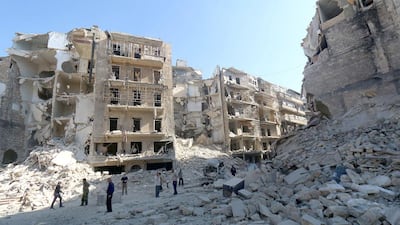A flurry of discussions involving the Americans, Russians, Saudis and others have led to speculation about a renewed push for negotiations to end the conflict in Syria. I can only hope the speculation is not mere wishful thinking, because it should have been clear from the beginning that a negotiated solution is the only way to end this long war.
From the very start, it should have been clear that the trajectory of the conflict was shaped by constants that could not be ignored. Years later, with over 250,000 dead and half of the country’s population displaced, the Syrian war has become more tragic and vastly more complex than anyone could have imagined at its beginning — but the constants remain.
First, it was clear that a significant group of Syrians wanted the regime to go. When demonstrators were met with deadly force, when civilians were killed with chemical weapons, or when neighbourhoods were devastated by barrel bombs, rage at the regime only grew.
At the same time, it is equally important to acknowledge that a substantial number of Syrians find security in the regime, fearful of what changes the opposition might bring. Whether religious minorities or secular urbanites, these Syrians view the religiously-motivated revolutionaries as an existential threat to what they see being Syrian means or to the very survival of their communities.
These Syrians have never had confidence in the external opposition. And with Al Qaeda and ISIL playing an increasingly dominant role on the ground, these Syrians have turned to the regime to defend them, despite their disdain for its policies.
Also clear from the outset was that what happened in Syria would be affected by the competing powers in the region. For Iran, Syria was a key ally and client they could ill afford to lose. For Russia, Syria was a strategic asset that they were unwilling to surrender. Turkey saw the Syrian conflict as a threat to its security and its internal politics. For Jordan and Lebanon, events in Syria have always posed a challenge to their fragile stability. And for the Gulf Arabs, Iran’s expanding regional role has been a threat that they have felt a need to confront.
Finally, given the recent experiences of sectarian conflict in Lebanon and Iraq, it should have been clear from the beginning that, if left unchecked, the conflict in Syria would only expand and take on an increasingly sectarian nature, with internal groupings aligned to external powers.
Given the regional balances of power, no side would or could win a decisive victory. As with Lebanon’s long civil war, there would be “no victor and no vanquished” in Syria.
In the fifth year of this nightmare, these constants still define the lay of the land. I remember back when the war’s death toll was 3,000, a group of Syrians told me the conflict would end “if only the US would give more weapons”. I countered by saying such a view ignored the other parties with interests in Syria. More weapons for the opposition would only result in increased Iranian and even Russian support for the regime and so it was foolish to believe one side could win. Unless steps were taken to reach a negotiated solution, however imperfect, we would be looking at 30,000 or even 300,000 dead.
It gives me no satisfaction that the conflict is approaching that higher figure but the same constants – the despised and bloody-handed regime, the fragmented and dysfunctional opposition, the increasingly extreme factions involved and the destabilising effect of millions of refugees on the neighbouring countries – prevail.
The Gulf states fear the nuclear deal with Iran will embolden it to increase support for its client in Damascus, prompting them to find ways to counter Iran in Syria. Meanwhile, Turkey has taken military action to counter both ISIL and Kurdish separatists. All this only pours more fuel on the raging fire.A further constant is that the solution today is the same as it was four years ago: a negotiated settlement.
There appears to be some consensus today that to avoid the disaster that befell Libya and Iraq, the structures of the Syrian state must not be allowed to collapse and that ISIL and Al Qaeda must be defeated.These goals can be met by the Geneva process that was once supported by all the relevant parties but which foundered over whether Bashar Al Assad should remain head of state.
Here is where the US, Russia and other countries must apply the pressure to help all sides find the way forward. As was the case at the end of Lebanon’s long war, a negotiated outcome won’t be perfect, nor will it be absolutely just. But it will help end the bloodshed, create a unified Syrian force to help defeat the extremists, and provide the opportunity for many Syrians to return home.
Syria’s wounds will not heal quickly but the transition must give all sides assurances that their basic demands will be met. This, not fanning the flames of conflict, must be the focus of international pressure if Syria is to find a way out of this long and horrible war.
James Zogby is the president of the Arab American Institute
On Twitter:@aaiusa


